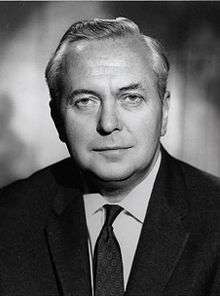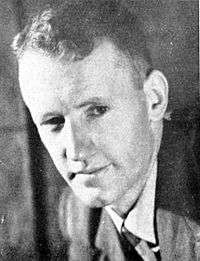Harry letters affair
Harry has developed a sudden enthusiasm for litigation. What with North Hull Harry wants a fair buzz of legal activity. Harry's financial problems apparently have been solved and he's in a generous mood.
Extract from a "Harry" letter, dated 2 February 1966, just after the Labour Party's by-election victory in Hull North[1]
The "Harry" letters, written by Peter Benenson, founder of the international human rights group Amnesty International, detail the funding during 1966 of Amnesty's mission in the Rhodesian capital of Salisbury by somebody or something referred to as "Harry", commonly interpreted as code for the British government, then headed by Prime Minister Harold Wilson. The letters were made public in March 1967 by Polly Toynbee, an Englishwoman who had worked for Amnesty in Salisbury while a 19-year-old gap year student during early 1966. Scandal resulted within both the British government and Amnesty; Benenson left the group soon after.
While with Amnesty in Rhodesia, Toynbee became suspicious of the disproportionately large amounts of money apparently at the disposal of Amnesty's mission there, as well as the modest scale of Amnesty's operations in both Rhodesia and Nigeria. Toynbee asked Benenson about the origin of the money, and pressed him on rumours that Britain was funding Amnesty's mission in Salisbury; according to her, he admitted it, and referred to it as "Operation Lordship". This ran at odds with Amnesty's claimed apolitical stance. Toynbee subsequently acquired a set of letters that appeared to confirm her suspicions. Addressed to an Amnesty official in Salisbury, they described efforts to gain external financing for the Rhodesia mission. Toynbee made the existence of the letters public in March 1967, concurrently alleging that Amnesty had been "bought off" by Whitehall.[2]
When questioned in parliament on payments by the government to Amnesty, Wilson said that his administration had indeed been "approached by a member of the organisation",[3] and had given a list of possible financial donors in response. Amnesty claimed that any such activities had been unilaterally conducted by Benenson on his own accord, and denied any collective wrongdoing. Benenson held that the money had been intended for Rhodesian political prisoners and their families, and said that the British government had wished for the payments to be kept secret for political reasons. The relationship between Whitehall and Amnesty was ended as a result of the affair, with Amnesty reaffirming its official impartiality.
Rhodesia mission
In early 1966, during her gap year from studies at Oxford University, Polly Toynbee served as the secretary for the peer and former West Indian cricketer Learie Constantine on an Amnesty International mission to Nigeria and Rhodesia,[1][4] two countries in Africa.[n 1] In Lagos, the Nigerian capital, Toynbee and the other Amnesty members were supposed to be helping political detainees, but Toynbee recalled that "We sat around drinking and entertaining the press. We must have spent an enormous amount but we never achieved anything. We never saw anyone important. We just got vague assurances that the prisoners were all right."[1] The mission then went on to Rhodesia, where the predominantly white minority government under Ian Smith had unilaterally declared independence the previous November. Since the declaration of independence there had been reports of mass arrests of black nationalist leaders.[1]
During Toynbee's six weeks in Salisbury, Toynbee and other volunteers dispensed funds to the families of political detainees, and tried to arrange legal aid for the prisoners. Toynbee claimed that Amnesty's operations in both Nigeria and Rhodesia were little more than nominal, and became suspicious of the financial situation surrounding the Salisbury mission in particular. Although Amnesty then had a modest budget for such a prominent organisation—it operated out of Benenson's cramped legal chambers, and during the financial year 1965–66 boasted an annual budget of only £7,000—Toynbee said she found that there was, in her own words, a seemingly "endless supply of money. I could go to the bank and draw out £200 at a time. And there was no check on what I did with the money."[6] When Amnesty founder Peter Benenson visited the group in Salisbury, Toynbee asked him where the funds came from, saying there were rumours flying around the city that it was coming from Whitehall, the British government. According to Toynbee, Benenson said the British government was indeed supplying money.[1] He reportedly described the transactions as "Operation Lordship".[6]
Toynbee reveals the letters
Toynbee and others were expelled from Rhodesia in March 1966 for refusing information to the police.[7] While she was there, however, she acquired some letters that she said had been abandoned in a safe. The letters appeared to have been written in London by Benenson between January and March 1966; some were typed, while others were in his handwriting. Alternately signed "Margaret" or "Peter", and addressed to the Amnesty representative in Salisbury, they contained frequent references to somebody or something called "Harry", which Toynbee interpreted as code for the UK government.[1]
Many of the letters contained detailed requests for payments and funding. One of them, dated 2 February 1966, included the passage "What with North Hull Harry wants a fair buzz of legal activity. Harry's financial problems apparently have been solved and he's in a generous mood."[1] Toynbee construed this as a reference to the Hull North by-election of the previous month, which had increased the Labour government's majority in the House of Commons from three to four members.[1] Toynbee's interest was aroused as Amnesty took pride in its declared apolitical stance, a concept very much at odds with the idea of funding from a national government.[2]
On 5 March 1967, Toynbee revealed the existence of the letters in newspaper interviews.[6] She claimed that Amnesty had been "bought off" by the British government; "Instead of dealing with legal test cases," she said, "it is wasting its time on welfare work which could equally well be done by the Red Cross".[2]
Fallout
The letters' public appearance caused a scandal.[1] Amnesty distanced itself from the Rhodesia mission, claiming that any such activities had been unilaterally undertaken by Benenson alone.[6] On 9 March, in the House of Commons, the Prime Minister Harold Wilson answered a parliamentary question on the letters from Knox Cunningham, who asked whether or not the "payments made to Amnesty International were made with his [Wilson's] authority; for what reason such payments were made; and what was the total amount paid by Her Majesty's Government during 1966 to Amnesty International."[3] Wilson replied that the government had been "approached by a member of the organisation concerned for the humanitarian purpose of helping the families of men who have been oppressively detained. We thought it right to suggest possible donors who might be willing to help."[3]
Benenson contended that the money had been for the prisoners and their families, and had not been gifted to Amnesty by the government. He insisted that the British government had wished the payments to remain secret for political reasons.[1] A private letter written by Benenson two months before Toynbee's interviews said that a third party, the hotelier Charles Forte, had been asked by Whitehall to provide £10,000 for the Rhodesia mission. In his letter, Benenson appeared to imply that Forte's donation might lead to an honour from the British government. Benenson later returned the money so as not to jeopardise the political reputation of the British government members involved in the payments.[7]
Following a state of crisis, Amnesty held a meeting in Denmark in March 1967, where Benenson's resignation was accepted. Benenson resigned on the grounds that Amnesty's offices had been bugged by the British government. In a report, Amnesty chairman Seán MacBride referred to Beneson's "erratic activities" and "unilateral decisions". Benenson responded by demanding MacBride's resignation, pointing out that the American Central Intelligence Agency had funded the International Commission of Jurists, of which MacBride was Secretary-General. The relationship between Amnesty and the British government was thereupon suspended. Amnesty vowed future impartiality, saying that it "must not only be independent and impartial but it must not be put into a position where anything else could even be alleged".[7] Whitehall concurrently switched its stance towards Amnesty from one of co-operation to "one of reserve".[7]
References
- Notes
- ↑ Following its 1965 Unilateral Declaration of Independence, Rhodesia regarded itself as an independent country, while Britain and the United Nations held that it was still a British colony.[5]
- References
- 1 2 3 4 5 6 7 8 9 10 Power, Jonathan (17 May 2001). Like Water on Stone: The Story of Amnesty International. UPNE. pp. 129–130. ISBN 978-1-55553-487-5. Retrieved 12 November 2012.
- 1 2 3 "Spiller of Beans". The Catholic Herald. 17 March 1967.
- 1 2 3 4 "Amnesty International (Donations)". Hansard. Retrieved 2012-11-18.
- ↑ McSmith, Andy (26 November 2006). "Polly Toynbee: Reborn, as a lady of the right". The Independent. London.
- ↑ Palley, Claire (1966). The constitutional history and law of Southern Rhodesia 1888–1965, with special reference to Imperial control (First ed.). Oxford: Clarendon Press. pp. 742–743. ASIN B0000CMYXJ.
- 1 2 3 4 Wong, Wendy H. (2008). Centralizing Principles: How Amnesty International Shaped Human Rights Politics Through Its Transnational Network. ProQuest. pp. 126–127. ISBN 978-0-549-54464-7. Retrieved 18 November 2012.
- 1 2 3 4 Forsythe, David P. (11 August 2009). Encyclopedia of Human Rights. Oxford University Press. pp. 164–165. ISBN 978-0-19-533402-9. Retrieved 12 November 2012.

